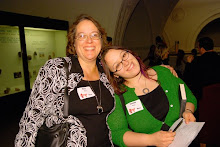In a few hours we begin mourning the destruction of the Temple. Tisha B'Av is considered the saddest day of the Jewish year, and this year it also marks exactly eleven months from the day my mother died. Tisha B'Av is the last day I'll be saying Kaddish.
This is the part where I would like to be writing something about healing and powerful the experience of saying Kaddish has been. I'd love to have something beautiful to say about being embraced by tradition, and finding myself truly invested in it in a way I never had been before. I could say something about moving forward, about treasuring the past while moving towards a life of future happiness… but that would all be complete and utter bullshit.
So many calamities happened to the Jewish people during the month of Av, that the Mishnah famously warns Jews from conducting any legal trials during this saddest of months, because during Av the verdict is sure to come out against us. This is somewhat enigmatic--one might expect the rabbis to try to paint the day in a more positive light and make some kind of statement about redemption coming eventually. But no, Tisha B'Av is set aside as a day to mourn for the past of the People of Israel--for everything we had that was destroyed or taken away from us. The insistence on sadness is so great that even studying Torah, that greatest of mitzvot, is prohibited (with a few depressing exceptions) on Tisha B'Av, lest we derive too much pleasure from our studies and forget the somber mood of the day.
I find all of this focus on sadness both satisfying and unjust. On the one hand, I fully appreciate the ability to spend tomorrow moping around feeling generally miserable, bitter, and forlorn. I'm pretty sure I have perfected miserable, bitter, and forlorn this year, and as I enter into the final formal stages of mourning for my mother, it is nice to be allowed--required, even--to focus on just how appalling the last two years have been. Conversely, I'm a little peeved that Tisha B'Av has taken the specialness of this moment from me. My last day of saying Kaddish was when I wanted to stand up in my community and have one last chance to show people that there are young people mourning amongst us. Selfishly, I wanted the attention, the hugs, the sympathy that many people get on their final day saying Kaddish. And I won't get that, because everyone else at minyan will be absorbed in their own thoughts of misery, persecution and pain in Jewish history.
This is all a nice little microcosm for how I've felt all year. I appreciate some of what traditional Jewish mourning practices seem to be saying and teaching, but ultimately, I find myself let down by the rituals and communities I had hoped I would find comforting. It has been eleven months of saying Kaddish, and I do not feel healed.
When my mom was sick I remember telling people I felt like I was falling apart, and I used to picture myself literally falling apart, limbs tumbling off of my torso. I was so upset all the time, I remember thinking things could not possibly get worse. On mornings when I held my mother as she writhed in pain, and at one point actually asked me to call my sisters so she could say goodbye to them, I remember thinking--it cannot get any worse than this. This is the hardest thing I will ever do. But I was almost laughably wrong. The days since my mother died have been thousands of times harder than the days that she was dying.
I had this vision of getting into a routine after my mother died. I thought I would find comfort in the day to day things, and that I would slowly begin to feel better. But the horrifying truth is that there was no routine to fall into without my mother. In the months after my mother died I felt as if my life exploded. I was no longer falling apart myself--instead, everything around me seemed to have gone psychotic. People who I loved and who had been supportive where suddenly hurtful, rude, or noticeably absent. Traditions--both religious and family--disappeared, or were transformed into grotesque acts that only demonstrated just how bizarre life could be.
The plain truth is that I have never felt more abandoned than I did this year. By my faith, by my community, by my family and friends. Even by my mother.



